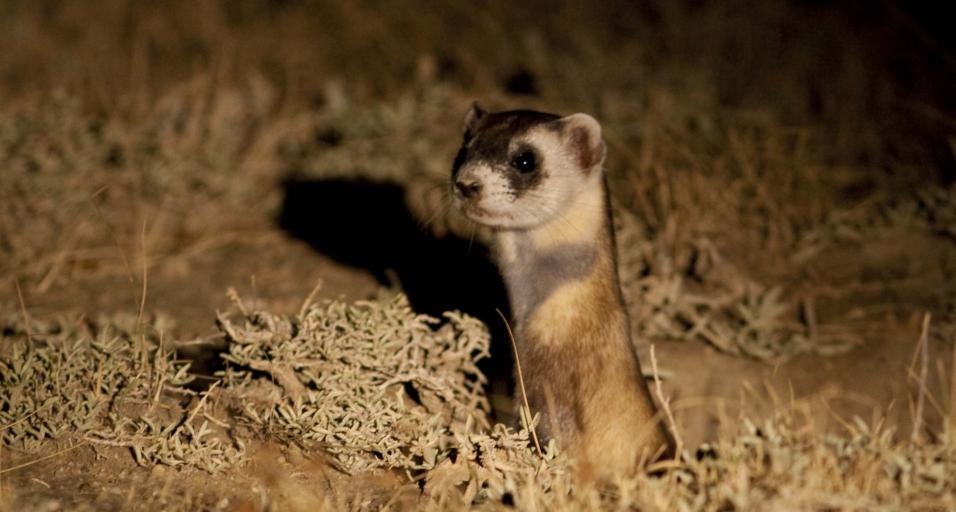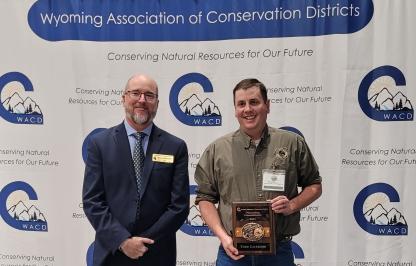Game and Fish to hold open house to discuss planning for black-footed ferret release
In 1981, black-footed ferrets were discovered near Meeteetse, Wyoming. North America’s only native ferret was thought to be extinct at that time, until local rancher, John Hogg, took the time to identify an animal his dog found, which turned out to be a black-footed ferret. Now, 35 years later, John Hogg’s family who still own the Lazy BV ranch; the owners of the neighboring Pitchfork ranch, where the original ferret colony was located; the Wyoming Game and Fish Department; and other partners are planning to release black-footed ferrets back at the site of the species re-discovery.
Final work is underway to ensure that the site is suitable for a release and to keep disease out of the proposed reintroduction area. Black-footed ferrets prey exclusively on prairie dogs and diseases like plague can impact both prairie dogs and ferrets.
The public is invited to learn more on May 18, 2016 from 4 to 6 p.m. Game and Fish is hosting an open house at the Meeteetse Museum to discuss its plan to release ferrets on the two local ranches. Game and Fish is still waiting to hear from the U.S. Fish and Wildlife Service if the Meeteetse site has been allocated ferrets for release. Game and Fish is expecting to know if it will receive ferrets in June.
“It is tremendously exciting to prepare for the possibility that we will release black-footed ferrets back where they came from,” said Zack Walker, Statewide Nongame Bird and Mammal Program Supervisor. “We again thank the landowners for their interest in advancing the recovery of this species. The entire black-footed ferret effort is dependent on ranchers stepping forward and that is certainly true in Wyoming.”
The original ferrets and their offspring were taken into captivity in the mid 1980s following a disease outbreak that threatened the remaining population. Only 18 of them survived, but a breeding program in Wyoming was successful. The breeding program is now run by the U.S. Fish and Wildlife Service. The first site where black-footed ferrets were released back in the wild was Wyoming’s Shirley Basin. That effort started in 1991, and a ferret population is established there now.
Though black-footed ferrets are on the endangered species list, a special exemption for the entire state of Wyoming was enacted in 2015 that specifies landowners engaged in legal activities cannot be punished if they accidentally harm or kill a ferret. Hosting of black-footed ferrets by landowners who want to help recover the species is voluntary.
Final work is underway to ensure that the site is suitable for a release and to keep disease out of the proposed reintroduction area. Black-footed ferrets prey exclusively on prairie dogs and diseases like plague can impact both prairie dogs and ferrets.
The public is invited to learn more on May 18, 2016 from 4 to 6 p.m. Game and Fish is hosting an open house at the Meeteetse Museum to discuss its plan to release ferrets on the two local ranches. Game and Fish is still waiting to hear from the U.S. Fish and Wildlife Service if the Meeteetse site has been allocated ferrets for release. Game and Fish is expecting to know if it will receive ferrets in June.
“It is tremendously exciting to prepare for the possibility that we will release black-footed ferrets back where they came from,” said Zack Walker, Statewide Nongame Bird and Mammal Program Supervisor. “We again thank the landowners for their interest in advancing the recovery of this species. The entire black-footed ferret effort is dependent on ranchers stepping forward and that is certainly true in Wyoming.”
The original ferrets and their offspring were taken into captivity in the mid 1980s following a disease outbreak that threatened the remaining population. Only 18 of them survived, but a breeding program in Wyoming was successful. The breeding program is now run by the U.S. Fish and Wildlife Service. The first site where black-footed ferrets were released back in the wild was Wyoming’s Shirley Basin. That effort started in 1991, and a ferret population is established there now.
Though black-footed ferrets are on the endangered species list, a special exemption for the entire state of Wyoming was enacted in 2015 that specifies landowners engaged in legal activities cannot be punished if they accidentally harm or kill a ferret. Hosting of black-footed ferrets by landowners who want to help recover the species is voluntary.
Wyoming Game and Fish (307) 777-4600



